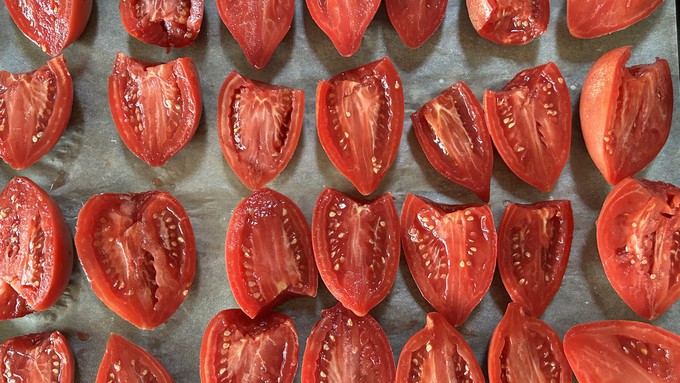
Advice for the vegetable garden, orchard, roses -- and late-summer produce

Washed, cored and sliced, these Rugby tomato halves at this point can be frozen or, with maybe a little salt or olive oil added, roasted. Check out the tomato-saving tips in the Garden Basics podcast. Kathy Morrison
If you were able to attend the most recent Open Garden Day, you witnessed the flurry of activity by the UCCE master gardeners staffing the Fair Oaks Horticulture Center. It's nearly autumn, which is an important transition time for backyard gardening.
"Farmer Fred" Hoffman, himself a lifetime master gardener, was on site for his popular "Garden Basics" podcast. He talked with some of the FOHC experts about how they're preparing the gardens for the cooler days ahead. Oh, and he talked to me, too, about one of my favorite topics: tomatoes, and what to do with them as the season winds down.
If you want to skip ahead to the podcast, you can find it here: https://gardenbasics.net/
Otherwise here's a quick recap of the master gardeners and their topics:
-- Gail Pothour, in the Vegetable Garden, discusses changing over the vegetable beds, including restoring the soil in advance of planting cool weather vegetables. She notes that the melon vines were being trimmed back, to focus the plants' energy on ripening the last melons of the season. She also adds a tip on growing a quick cover crop: buckwheat.
-- Quentyn Young, a project leader in the Orchard, talks about finishing up the summer pruning, the trees' changing water needs, and the maintenance of the citrus trees. He notes that the Orchard Team is going to try something new next year: growing bananas!
-- Anita Clevenger, who is an old-rose expert and a project leader in the Water-Efficient Landscape, discusses rose care and maintenance for this time of year. She covers deadheading, rose hips, pruning schedules, and the use of alfalfa pellets, among other topics.
My segment primarily concerned ways to save what's left of the tomato harvest. Hint: It helps to have some room in your freezer.
Separately, Fred talks to retired horticulture professor Debbie Flower about "When do pesticides expire?" It includes particular discussion about the shelf life of Bt (bacillus thuringiensis), a bacterium used to kill caterpillars.
Fred Hoffman's garden advice also is found in "Beyond Basics: The Garden Basics with Farmer Fred Newsletter." In another look at fall garden preparation, he posed this question to master gardener Susan Muckey: If the worms in your vermiculture system could talk, what would they tell you this time of year? Susan's a vermicomposting specialist and she has a binful of excellent advice.
Just a note: The next Open Garden Day at the Fair Oaks Horticulture Center is Wednesday, Oct. 11, from 9 a.m. to noon, 11549 Fair Oaks Blvd., Fair Oaks. It's a great opportunity to talk to the master gardeners in person.
Comments
0 comments have been posted.Sacramento Digs Gardening to your inbox.
Sites We Like
Garden Checklist for week of April 21
This week there’s plenty to keep gardeners busy. With no rain in the immediate forecast, remember to irrigate any new transplants.
* Weed, weed, weed! Get them before they flower and go to seed.
* April is the last chance to plant citrus trees such as dwarf orange, lemon and kumquat. These trees also look good in landscaping and provide fresh fruit in winter.
* Smell orange blossoms? Feed citrus trees with a low dose of balanced fertilizer (such as 10-10-10) during bloom to help set fruit. Keep an eye out for ants.
* Apply slow-release fertilizer to the lawn.
* Thoroughly clean debris from the bottom of outdoor ponds or fountains.
* Spring brings a flush of rapid growth, and that means your garden is really hungry. Feed shrubs and trees with a slow-release fertilizer. Or mulch with a 1-inch layer of compost.
* Azaleas and camellias looking a little yellow? If leaves are turning yellow between the veins, give them a boost with chelated iron.
* Trim dead flowers but not leaves from spring-flowering bulbs such as daffodils and tulips. Those leaves gather energy to create next year's flowers. Also, give the bulbs a fertilizer boost after bloom.
* Pinch chrysanthemums back to 12 inches for fall flowers. Cut old stems to the ground.
* Mulch around plants to conserve moisture and control weeds.
* From seed, plant beans, beets, cantaloupes, carrots, corn, cucumbers, melons, radishes and squash.
* Plant onion sets.
* In the flower garden, plant seeds for asters, cosmos, celosia, marigolds, salvia, sunflowers and zinnias.
* Transplant petunias, zinnias, geraniums and other summer bloomers.
* Plant perennials and dahlia tubers for summer bloom.
* Mid to late April is about the last chance to plant summer bulbs, such as gladiolus and tuberous begonias.
* Transplant lettuce seedlings. Choose varieties that mature quickly such as loose leaf.